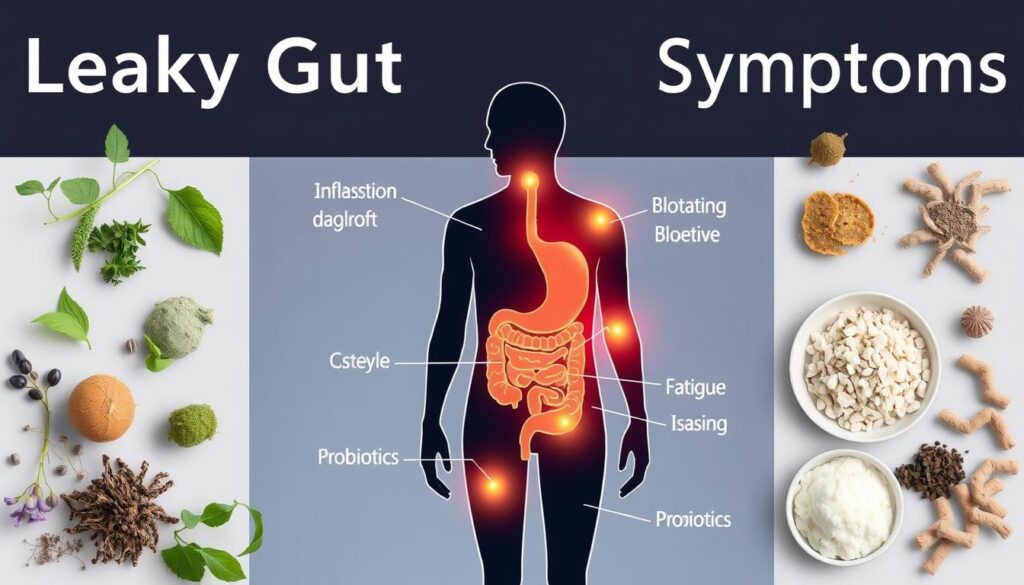Maintaining a healthy gut is essential for overall well-being, as our digestive system is intricately linked to many aspects of our physical and mental health. One condition that has garnered significant attention in recent years is leaky gut syndrome, also known as increased intestinal permeability. This comprehensive guide will explore the symptoms, causes, and natural solutions for addressing this increasingly prevalent issue.
Key Takeaways
- Leaky gut is a condition where the intestinal lining becomes permeable, allowing undigested food particles, toxins, and bacteria to enter the bloodstream.
- Common causes of leaky gut include poor diet, stress, infections, and certain medications.
- Symptoms of leaky gut can include digestive issues, food intolerances, mood disorders, and inflammatory conditions.
- Leaky gut is closely linked to autoimmune diseases, as it can trigger an inappropriate immune response.
- Natural solutions for healing leaky gut include dietary changes, probiotics, and lifestyle modifications.
What is Leaky Gut?
Leaky gut, also known as increased intestinal permeability, is a condition where the gut lining becomes damaged, allowing toxins, undigested food particles, and other harmful substances to enter the bloodstream. This breach in the gut barrier function can have far-reaching effects on overall health and well-being.
Definition of Leaky Gut
Leaky gut refers to the condition where the tight junctions between the cells lining the intestinal wall become compromised, allowing larger molecules to pass through the gut barrier. This disruption in the gut’s normal permeability can lead to a range of digestive issues and other health problems.
How It Occurs
The gut lining is designed to selectively allow nutrients to pass through while keeping out harmful substances. However, various factors can weaken this protective barrier, leading to leaky gut. These include poor diet, chronic stress, certain medications, and environmental toxins, all of which can damage the delicate gut epithelium.
Common Causes
- Unhealthy diet, high in processed foods, sugar, and refined carbs
- Chronic stress, which can disrupt the gut-brain axis
- Frequent use of antibiotics, anti-inflammatory drugs, and other medications
- Exposure to environmental toxins, such as pesticides and heavy metals
- Underlying health conditions, like inflammatory bowel diseases
When the gut barrier function is compromised, it can set the stage for a range of digestive issues and potentially lead to more serious health problems, including autoimmune disorders. Understanding the causes and mechanisms of leaky gut is the first step in addressing this widespread and often overlooked condition.
Symptoms of Leaky Gut
Leaky gut, a condition characterized by increased intestinal permeability, can manifest through a variety of symptoms. Understanding these signs is crucial for early detection and proper management of gut health issues, including food sensitivities, digestive issues, and inflammatory conditions.
Digestive Issues
One of the most common symptoms of leaky gut is digestive distress. Individuals with leaky gut may experience bloating, gas, abdominal pain, diarrhea, or constipation. These digestive issues can significantly impact overall well-being and quality of life.
Food Intolerances
Leaky gut can lead to an increased immune response to certain foods, resulting in food sensitivities or intolerances. Individuals with leaky gut may find that they react negatively to previously well-tolerated foods, such as gluten, dairy, or even certain fruits and vegetables.
Mood Disorders
Interestingly, leaky gut has been linked to various mood disorders, including anxiety and depression. The gut-brain connection is a complex and fascinating area of research, and maintaining a healthy gut can have a positive impact on mental well-being.
Inflammatory Conditions
Leaky gut can also contribute to the development of inflammatory conditions, such as inflammatory bowel disease, arthritis, and even skin conditions like eczema. The increased intestinal permeability associated with leaky gut allows for the passage of harmful substances, triggering an inflammatory response throughout the body.

By recognizing these diverse symptoms, individuals can take proactive steps to address the underlying causes of leaky gut and improve their overall health and well-being.
Leaky Gut and Its Connection to Autoimmune Diseases
Autoimmune disorders are a complex web of conditions where the body’s immune system mistakenly attacks its own healthy cells and tissues. Surprisingly, the health of your gut may play a crucial role in the development and progression of these autoimmune responses.
Understanding Autoimmunity
Autoimmune diseases occur when the immune system becomes dysregulated, leading it to target the body’s own tissues. This can manifest in a wide range of conditions, from inflammatory bowel disease to rheumatoid arthritis and multiple sclerosis. Maintaining a delicate balance in the immune system is critical for preventing these self-destructive reactions.
How Leaky Gut Influences Autoimmune Responses
Emerging research suggests that a condition known as leaky gut may be a key contributor to the development of autoimmune disorders. When the gut barrier becomes permeable, allowing undigested food particles, toxins, and microbes to enter the bloodstream, the immune system can become overactivated and begin attacking the body’s own cells.
This inflammatory response can then trigger or exacerbate a range of autoimmune disorders, including inflammatory bowel disease and other gut health-related conditions. Addressing the underlying causes of leaky gut, such as poor diet, stress, and gut dysbiosis, may be an essential step in managing and preventing these autoimmune challenges.
“Leaky gut has been linked to a range of autoimmune conditions, underscoring the critical importance of maintaining a healthy, balanced gut microbiome.”
Testing for Leaky Gut
Identifying leaky gut can be a complex process, as it often involves a combination of diagnostic tests and a comprehensive evaluation by a healthcare professional. Let’s explore the common methods used to assess intestinal permeability and determine when it’s necessary to seek professional help.
Common Diagnostic Tests
One of the most well-known tests for leaky gut is the lactulose-mannitol test. This non-invasive procedure measures the absorption of these two different-sized sugar molecules, which can provide insights into the integrity of the gut barrier function. Additionally, a zonulin test can help detect elevated levels of this protein, which is often associated with increased intestinal permeability.
These diagnostic tests can be valuable in confirming the presence of gut barrier function issues and intestinal permeability concerns. However, it’s important to note that they should be interpreted in the context of a comprehensive medical evaluation, as digestive issues can have various underlying causes.
When to Seek Professional Help
If you’re experiencing persistent digestive issues, food intolerances, or other symptoms that may be related to leaky gut, it’s recommended to consult a healthcare professional. They can perform the necessary diagnostic tests, review your medical history, and develop a personalized treatment plan to address the root cause of your condition.
Seeking professional guidance is particularly important if you suspect an underlying autoimmune disorder or have a family history of such conditions, as leaky gut can be closely linked to the development of these complex health issues.

“Addressing the root cause of leaky gut is essential for long-term health and well-being.”
Natural Solutions to Heal Leaky Gut
Addressing the root causes of leaky gut requires a comprehensive approach that combines dietary changes, probiotic support, and lifestyle modifications. By incorporating these natural solutions, you can take steps towards restoring your gut barrier and improving overall digestive health.
Dietary Changes
One of the most effective ways to heal leaky gut is through dietary adjustments. Focusing on gut healing foods, such as bone broth, fermented vegetables, and healthy fats, can provide the necessary nutrients and support for gut repair. Eliminating inflammatory triggers, like gluten, dairy, and processed foods, can also alleviate symptoms and promote a healthier digestive system.
Probiotics and Gut Health
Incorporating probiotics into your diet is crucial for restoring the balance of beneficial gut bacteria. Probiotic supplements or fermented foods, like kefir, yogurt, and sauerkraut, can help replenish the gut microbiome and strengthen the gut barrier. By supporting a healthy gut flora, probiotics can contribute to dietary solutions for leaky gut.
Lifestyle Modifications
Beyond dietary changes, addressing lifestyle factors can also play a significant role in healing leaky gut. Reducing stress, getting adequate sleep, and incorporating gentle exercises, such as yoga or walking, can all help support gut health. Stress management techniques, like meditation or deep breathing, can also be beneficial in reducing inflammation and promoting overall well-being.
By combining these natural solutions, you can take an important step towards addressing the root causes of leaky gut and improving your overall digestive health.
Foods to Eat for a Healthy Gut
Maintaining a healthy gut is crucial for overall well-being, and the foods you consume play a significant role in supporting gut health. Discover the gut-healing foods, beneficial supplements, and the importance of fiber in promoting a thriving digestive system.
Gut-Healing Foods
Incorporate these nutrient-dense foods into your diet to nourish your gut and support its healing process:
- Bone broth: Rich in collagen and amino acids, bone broth helps repair the gut lining and reduce inflammation.
- Fermented vegetables: Packed with probiotics, fermented foods like sauerkraut and kimchi support a healthy gut microbiome.
- Omega-3-rich fish: Salmon, mackerel, and sardines contain anti-inflammatory omega-3 fatty acids that can calm gut inflammation.
Nutritional Supplements
In addition to a gut-healthy diet, certain supplements can provide additional support for gut healing and overall gut health:
- Probiotics: These beneficial bacteria help restore the balance of the gut microbiome and promote digestive function.
- Glutamine: This amino acid helps repair and strengthen the gut lining, reducing intestinal permeability.
- Zinc: Plays a crucial role in maintaining the integrity of the gut barrier and supporting immune function.
The Role of Fiber
Fiber is essential for maintaining a healthy gut. It acts as a prebiotic, providing fuel for the beneficial bacteria in your gut. Incorporating a variety of high-fiber foods, such as fruits, vegetables, whole grains, and legumes, can help support your gut health and promote regular bowel movements.

Foods to Avoid with Leaky Gut
If you’re dealing with food sensitivities, digestive issues, or poor gut health, it’s crucial to identify and avoid certain foods that can exacerbate your symptoms. Leaky gut, a condition where the intestinal lining becomes damaged and allows undigested particles to enter the bloodstream, can be greatly influenced by the foods you consume.
Common Triggers
Some of the most common food triggers for individuals with leaky gut include:
- Gluten: Found in wheat, barley, and rye, gluten can be highly inflammatory for those with leaky gut.
- Dairy products: Milk, cheese, and other dairy items may cause digestive distress and worsen leaky gut symptoms.
- Refined sugars: Processed, high-sugar foods can feed harmful gut bacteria and contribute to inflammation.
- Alcohol: Excessive alcohol consumption can damage the gut lining and disrupt the delicate balance of gut microbiome.
Processed Foods and Additives
In addition to specific food triggers, individuals with leaky gut should also be mindful of processed foods and food additives. Highly processed items often contain preservatives, artificial colors, and other chemicals that can further compromise gut health. Opt for whole, minimally processed foods whenever possible to support your healing journey.
| Food Category | Foods to Avoid | Reasons to Avoid |
|---|---|---|
| Grains | Wheat, barley, rye | Contains gluten, which can trigger inflammation in those with leaky gut |
| Dairy | Milk, cheese, yogurt | Dairy products can be difficult to digest and may exacerbate digestive issues |
| Sweeteners | Refined sugars, high fructose corn syrup | Feeds harmful gut bacteria and can contribute to inflammation |
| Beverages | Alcohol, soda, fruit juices | Alcohol can damage the gut lining, while sugary drinks can disrupt gut microbiome |
| Processed Foods | Packaged snacks, frozen meals, fast food | Contain preservatives, additives, and other chemicals that can harm gut health |
By being mindful of these common food sensitivities and avoiding processed foods and additives, individuals with leaky gut can take an important step towards supporting their digestive issues and improving their overall gut health.
The Role of Stress in Gut Health
Stress can have a profound impact on our overall health, and it is particularly problematic when it comes to gut health. The connection between stress and digestive issues is well-documented, and understanding this relationship is crucial for maintaining a healthy gut.
How Stress Affects Digestion
When we experience stress, our bodies go into fight-or-flight mode, triggering the release of hormones like cortisol. This physiological response can disrupt the delicate balance of our gut microbiome, leading to increased intestinal permeability, also known as “leaky gut.” As a result, undigested food particles, toxins, and pathogens can enter the bloodstream, causing inflammation and various digestive problems.
Managing Stress for Better Gut Health
- Practice stress-reducing techniques, such as meditation, deep breathing, or yoga.
- Engage in regular physical activity, which can help alleviate stress and improve gut health.
- Prioritize getting enough sleep, as sleep deprivation can exacerbate stress and disrupt gut function.
- Incorporate adaptogenic herbs and supplements, like ashwagandha or rhodiola, to help the body better cope with stress.
- Seek support from mental health professionals or join a support group if dealing with chronic stress or anxiety.
By addressing the role of stress in gut health and implementing effective stress management strategies, individuals can take an important step toward improving their gut health, reducing digestive issues, and promoting overall wellness through lifestyle modifications.

The Importance of Hydration for Gut Health
Proper hydration plays a crucial role in maintaining a healthy gut. Water is essential for various digestive processes, from nutrient absorption to waste elimination. When the body is dehydrated, it can disrupt the delicate balance of the gut microbiome and lead to a range of digestive issues.
How Water Affects Digestion
Water helps to soften and break down food, making it easier for the digestive system to process. It also aids in the production of digestive enzymes and juices, such as saliva, stomach acid, and bile, which are necessary for effective nutrient absorption. Additionally, water helps to regulate bowel movements and prevent constipation, a common symptom of gut health problems.
Infused Water Recipes
Staying hydrated doesn’t have to be boring. Infusing water with various fruits, herbs, and vegetables can enhance the flavor and provide additional dietary solutions for digestive issues. Here are a few refreshing infused water recipes to try:
- Cucumber, lemon, and mint
- Strawberry, basil, and lime
- Ginger, lemon, and honey
- Blueberry, rosemary, and orange
These infused water concoctions not only taste delicious but also provide a natural boost of essential vitamins, minerals, and antioxidants that can support overall gut health.

Staying hydrated and incorporating these tasty infused water recipes into your daily routine can be a simple yet effective way to support your gut health, improve digestion, and promote overall well-being.
The Relationship Between Leaky Gut and Skin Health
The gut-skin connection is a fascinating aspect of human health. Increasing evidence suggests that an imbalance in gut health, known as leaky gut, can have a significant impact on the health and appearance of our skin. By understanding this relationship, we can explore natural remedies to address common skin conditions.
Common Skin Conditions
Leaky gut has been linked to a variety of skin problems, including eczema, psoriasis, acne, and rosacea. When the intestinal barrier is compromised, it allows harmful substances to enter the bloodstream, triggering an inflammatory response that can manifest in the skin. This inflammatory process can exacerbate existing skin conditions or contribute to the development of new ones.
Natural Remedies for Skin Issues
- Incorporate gut-healing foods: Probiotic-rich foods like yogurt, kefir, and fermented vegetables can help restore the balance of gut flora and reduce inflammation.
- Increase anti-inflammatory nutrients: Foods rich in omega-3 fatty acids, such as wild-caught salmon, walnuts, and flaxseeds, can help calm skin irritation.
- Manage stress: Chronic stress can disrupt the gut-skin axis, so regular stress-relief practices, such as meditation or yoga, can be beneficial.
- Avoid common triggers: Steer clear of processed foods, gluten, and dairy, which can exacerbate inflammatory skin conditions.
By addressing the underlying gut health issues, individuals with skin conditions related to leaky gut can find natural and effective solutions to achieve clearer, healthier skin.
| Skin Condition | Potential Gut Health Link | Natural Remedies |
|---|---|---|
| Eczema | Increased intestinal permeability and inflammation | Probiotics, omega-3s, anti-inflammatory herbs |
| Psoriasis | Gut dysbiosis and autoimmune response | Gut-healing diet, stress management, sun exposure |
| Acne | Imbalance in gut microbiome and hormonal changes | Probiotic-rich foods, zinc supplements, topical tea tree oil |
| Rosacea | Small intestinal bacterial overgrowth (SIBO) | Low-FODMAP diet, antimicrobial herbs, stress reduction |

By addressing gut health through dietary and lifestyle changes, individuals with skin conditions can find natural and effective solutions to achieve clearer, healthier skin.
Seeking Professional Help for Leaky Gut
While making dietary and lifestyle changes can go a long way in healing a leaky gut, there may come a time when seeking professional medical assistance becomes necessary. Consulting with a qualified healthcare provider can help you get to the root cause of your gut issues and develop a comprehensive treatment plan.
When to Consult a Specialist
If you’ve been consistently experiencing persistent digestive problems, food intolerances, or other troubling symptoms associated with leaky gut, it may be time to schedule an appointment with a gastroenterologist or functional medicine practitioner. These specialists can perform advanced testing to diagnose the extent of your gut permeability and identify any underlying conditions that may be contributing to your health concerns.
Holistic Approaches to Treatment
When working with a professional to address leaky gut, a holistic approach that combines conventional medicine with dietary and lifestyle interventions is often the most effective. Your healthcare provider may recommend a combination of supplements, dietary modifications, stress management techniques, and other natural therapies to support gut healing and overall well-being. By taking a comprehensive, integrative approach, you can work towards restoring your gut health and preventing the development of more serious health problems.